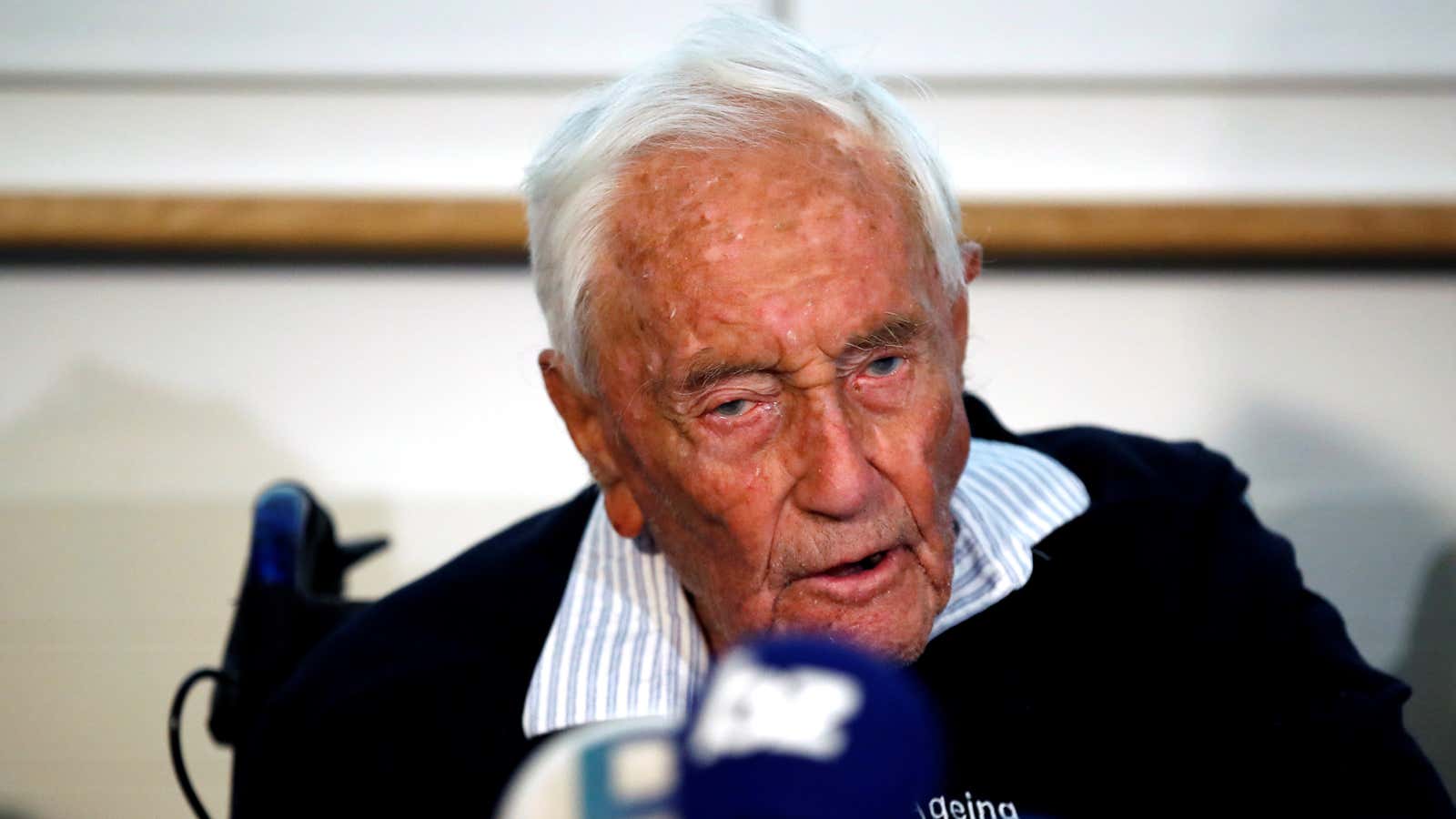After 104 years of life, Australian scientist David Goodall welcomed death, and he killed himself. But he did it his way, making an eloquent statement in support of a cause he believed in deeply—the right to die when, and how, we want.
For 20 years, Goodall, a botanist and ecologist, was a member of Exit International, an end-of-life advocacy group based in Australia, where assisted suicide is still illegal. On May 10, the scientist died by his own hand, turning a wheel that administered a lethal injection, at a clinic in Basel, Switzerland. He was surrounded by family, listening to a symphony, after having dined on a final meal of fish and chips.
Goodall spent the day before his death in the Basel University botanical gardens with three of his grandchildren. He also held a press conference to explain his actions. ”At my age, and even rather less than my age, one wants to be free to choose the death when the death is the appropriate time,” he told reporters. “It’s my own choice to end my life tomorrow and I look forward to that.”
The scientist was not terminally ill, but his eyesight was failing, and he was in a wheelchair. Goodall said that for the last five to ten years, his quality of life had deteriorated and he felt ready to die. He attempted but failed to commit suicide on his own earlier in the year, according to Exit International.
The 20,000-member right-to-die organization argues that death is an individual issue, and not necessarily a medical matter. It supports both voluntary euthanasia, which is deliberate death at the hand of another, and rational suicide, or self-inflicted death, for the mentally lucid. The nonprofit’s’s website explains its position:
[E]very adult of sound mind has the right to implement plans for the end of their life so that their death is reliable, peaceful and at a time of their choosing. Exit believes that control over one’s life and death to be a fundamental civil right from which no one of sound mind should be excluded.
Goodall traveled far, literally and figuratively, for the occasion of his death, and he was impatient with the administration involved in dying. “What are we waiting for,” he asked when filling out paperwork before the final act.
To the botanist, who was ready to go, the formalities no doubt seemed unnecessary. His decision was controversial, however, and captured the world’s attention. The right to die is recognized only in Canada, the Netherlands, Luxembourg, Switzerland, and five US states—Oregon, Montana, Washington, Vermont, and California.
“It was clear he wanted to go out while getting a lot of attention,” Stephen Drake, a research analyst with the Rochester, New York-based advocacy group Not Dead Yet, told the Catholic News Agency. “If someone acts as he does, for people to call it a personal act is a lie; it was a political act.” Drake’s organization opposes the legalization of assisted suicide and euthanasia for the “old, ill, and disabled” on secular and social justice grounds, arguing that these are “deadly forms of discrimination.”
But Goodall couldn’t have been more clear about his desires. Before the scientist could administer the injection that would end his life, he had to answer questions that proved he was lucid, knew who he was, and understood what he was doing. Australian doctors had earlier threatened to block him from leaving the country to go to Basel, saying after his failed suicide attempt that he posed a danger to himself. According to physician Philip Nitschke, Exit International’s founder, who accompanied Goodall on his one-way trip to Switzerland, the scientist’s last words were, “This is taking an awful long time.”
The last thing Goodall heard was the closing movement of Beethoven’s Ninth Symphony, Ode to Joy, a sampling of which he’d sung for reporters at the press conference the day before.
To the end, the scientist evidenced a sense of humor and a lively spirit that might seem enviable to many people much younger than him. It was perhaps for this reason that he was so determined to go on his own terms.
